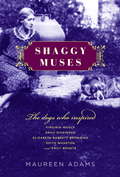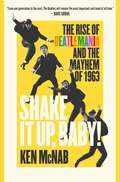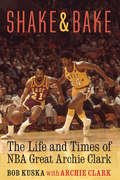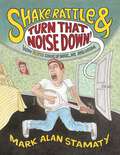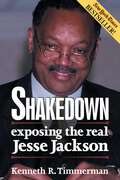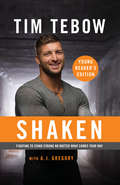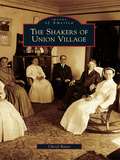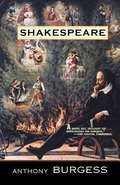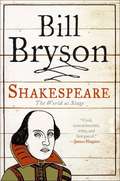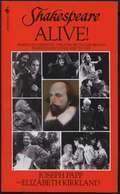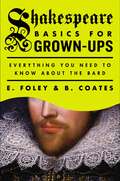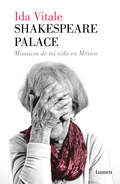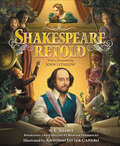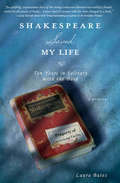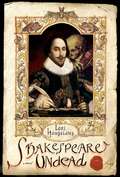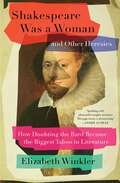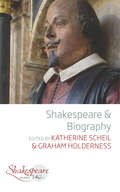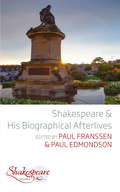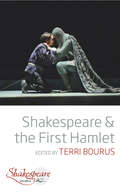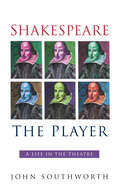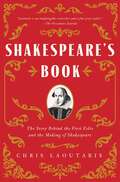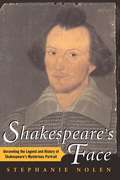- Table View
- List View
Shaggy Muses: The Dogs Who Inspired Virginia Woolf, Emily Dickinson, Elizabeth Barrett Browning, Edith Wharton, and Emily Bronte
by Maureen Adams&“You&’ll call this sentimental–perhaps–but then a dog somehow represents the private side of life, the play side,&” Virginia Woolf confessed to a friend. And it is this private, playful side, the richness and power of the bond between five great women writers and their dogs, that Maureen Adams celebrates in this deeply engaging book. In Shaggy Muses, we visit Elizabeth Barrett Browning and Flush, the golden Cocker Spaniel who danced the poet away from death, back to life and human love. We roam the wild Yorkshire moors with Emily Brontë, whose fierce Mastiff mix, Keeper, provided a safe and loving outlet for the writer&’s equally fierce spirit. We enter the creative sanctum of Emily Dickinson, which she shared only with Carlo, the gentle, giant Newfoundland who soothed her emotional terrors. We mingle with Edith Wharton, whose ever-faithful Pekes warmed her lonely heart during her restless travels among Europe and America&’ s social and intellectual elite. We are privileged guests in the fragile universe of Virginia Woolf, who depended for emotional support and sanity not only on her human loved ones but also on her dogs, especially Pinka–a gift from her lover, Vita Sackville-West–a black Cocker Spaniel who became a strong, bright thread in the fabric of Virginia and Leonard Woolf&’s life together.Based on diaries, letters, and other contemporary accounts–and featuring many illustrations of the writers and their dogs– these five miniature biographies allow us unparalleled intimacy with women of genius in their hours of domestic ease and inner vulnerability. Shaggy Muses also enchants us with a pack of new friends: Flush, Keeper, Carlo, Foxy, Linky, Grizzle, Pinka, and all the other devoted canines who loved and served these great writers.
Shah Husain
by Harjinder Singh DhillonOn the works of Shah Husain, 1539-1599, Panjabi Sufi poet; includes selections translated into English.
Shake It Up, Baby!: The Rise of Beatlemania and the Mayhem of 1963
by Ken McNabA vivid, captivating account of the Beatles&’s musical transformation throughout the pivotal year of 1963, as the world became caught up in the maelstrom of Beatlemania and its far-reaching cultural impact. The Beatles broke up more than half a century ago, yet millions around the globe are still drawn to the legacy of four lads from Liverpool. From the carefree innocence of "A Hard Day's Night" to the experimental psychedelia of "Lucy In The Sky With Diamonds,&” their message of love, peace, and hope still resonates. In Shake It Up, Baby! we go back to the start—to 1963, when they went from playing in small clubs in the remote Scottish Highlands to four number one singles, two number one albums, three national tours, and being besieged by thousands of fans at gigs all over Britain. Ken McNab tells the story through gripping, exclusive eye-witness accounts from those who were there: the Beatlemaniacs, the journalists, broadcasters, and television producers who were scrambling to make sense of it all—and the other bands who could only watch in awe as the Beatles went from bottom of the bill to headline act to the biggest band on the planet, forever transforming musical history.
Shake and Bake: The Life and Times of NBA Great Archie Clark
by Bob Kuska Archie ClarkShake and Bake is the story of Archie Clark, one of the top playmaking guards in the 1970s pre-merger NBA. While not one of the game&’s most recognized superstars, Clark was a seminal player in NBA history who staggered defenders with the game&’s greatest crossover dribble (&“shake and bake&”) and is credited by his peers as the originator of today&’s popular step-back move. Signed as the Lakers third-round draft pick in 1966, Clark worked his way into the starting lineup in his rookie year. But Clark was more than a guaranteed double-double whenever he stepped on the floor. He was a deep-thinking trailblazer for players&’ rights. Clark often challenged coaches and owners on principle, much to the detriment of his career and NBA legacy, signing on as a named litigant in the seminal Robertson v. NBA antitrust case that smashed the player reserve system and jump-started the modern NBA. So lace up your high-top Chuck Taylors, squeeze into a pair of short shorts, and shake and bake back in time to the days of Wilt, Russell, Oscar, Jerry, Elgin, Hondo—and Archie.
Shake, Rattle & Turn That Noise Down!: How Elvis Shook Up Music, Me & Mom
by Mark Alan StamatyFOR HIS EIGHTH birthday, Mark Alan Stamaty’s parents gave him his very own radio. Little did his mother realize that that innocent-looking plastic box would one day be the gateway for a new kind of sound that would “rock” her nearly out of her mind. . . .Mark first heard the howling thunder of Elvis Presley singing “Hound Dog” on the radio one lazy day and his life was forever changed. Soon he was styling his hair like the King and practicing his dance moves with a tennis racket as his pretend guitar in front o f the mirror. But his mother lived in constant fear that her son’s new love of rock ’n’ roll would turn him into a juvenile delinquent. Could Mark’s performance at his Cub Scout talent show change her mind?
Shakedown: Exposing the Real Jesse Jackson
by Kenneth R. TimmermanFew political figures in America today arouse as much passion as the Reverend Jesse Jackson. A hero to some in the black community, Jackson is credited with helping to break down barriers to political and economic access. But to other black leaders, Jackson has become a symbol for all that has gone wrong with their community. "Jesse virtually invented black racism," the Reverend Johnny Hunter, a black pastor from Virginia Beach, tells me. The Reverend Jesse Lee Peterson, a black conservative, calls Jackson a "gatekeeper of black progress" and a "race hustler"1 who has cashed in on white guilt to fund an opulent lifestyle and a personal power base. "He is really just a David Duke in black skin," Peterson says.
Shaken: Fighting to Stand Strong No Matter What Comes Your Way
by Tim TebowYour identity is defined--not by changing circumstances-- but an unchanging God!Whether you’re celebrating an incredible victory or facing life’s biggest disappointment, your response will reveal who you really are.In this powerful book designed specifically for young Christians, Heisman Trophy winner Tim Tebow provides an intimate look into how he’s been able to face professional triumphs and defeats and still emerge with his faith and identity intact. In Shaken: The Young Reader’s Edition, Tebow shares his insight for shaping an identity based not on your highs and lows, but on God. He examines the courageous lives of Biblical figures and the many inspirational people he’s met to show you how to: Overcome your fears and accept God’s perfect, unconditional loveTransform your insecurities into opportunities for growthEmbrace your unique, God-given talents to make a difference in your world With honesty that speaks directly to the heart, Tebow will inspire you to build a God-centered identity and begin today to live out your divine purpose!
Shakers of Union Village, The
by Cheryl BauerFounded in 1805, Union Village began as a religious and communal experiment. Eventually it became one of America's largest and most productive Shaker communities, its members achieving many firsts in education, equality, music, horticulture, and animal husbandry. Their unique faith influenced every aspect of their lives, from making furniture to raising children. They welcomed the leading figures of the period, including Native American chiefs, politicians, and abolitionists, while they continued to open other Shaker settlements in Ohio, Kentucky, Indiana, and Georgia. These vintage images--including many never published before--trace the Shakers' progress as they worked toward creating an earthly paradise. Although Union Village dissolved in 1912, some Shakers remained there for almost another decade. Today Union Village's heritage is still shared with the public at OtterbeinLebanon Retirement Community and in neighboring Lebanon.
Shakespeare
by Anthony BurgessLike Burgess's early novel, Nothing Like the Sun: A Story of Shakespeare's Love-Life, this equally delightful factual treatment of what we know of the Bard combines Burgess's stimulating erudition and his well-informed imagination. The result is at once a speculative biography, a theatrical history, and a re-creation of the Elizabethan age. Whether a vivid retracing of the evolution Elizabethan theater, a bravura reconstruction of the first performance of Hamlet, an infiltration of the intricacies of the court of the Virgin Queen, or an elegy on the era's end with the distrastrous Essex Rebellion, Burgess -- author of the classic A Clockwork Orange -- sets the stage for England's most glorious time and turns the spotlight on the figure of William Shakespeare. <p><p>"Animated by affection and an understanding of the creative imagination that only a creative writer can bring to bear."—Atlantic Monthly<p> "A smooth-flowing narrative, often enlivened by Anthony Burgess's Joycean appetite for linguistic fantasy."—Economist<p> "Bright, racy...knowledgeable and humorous, alternately sensible and quirky."—Terry Eagleton, Commonweal <p>"Burgess's wonderfully well-stocked mind and essentially wayward spirits are just right for summoning up an apparition of the Bard...."—Daily Telegraph
Shakespeare
by Bill BrysonWilliam Shakespeare, the most celebrated poet in the English language, left behind nearly a million words of text, but his biography has long been a thicket of wild supposition arranged around scant facts. With a steady hand and his trademark wit, Bill Bryson sorts through this colorful muddle to reveal the man himself. Bryson documents the efforts of earlier scholars, from today's most respected academics to eccentrics like Delia Bacon, an American who developed a firm but unsubstantiated conviction that her namesake, Francis Bacon, was the true author of Shakespeare's plays. Emulating the style of his famous travelogues, Bryson records episodes in his research, including a visit to a bunkerlike room in Washington, D.C., where the world's largest collection of First Folios is housed. Bryson celebrates Shakespeare as a writer of unimaginable talent and enormous inventiveness, a coiner of phrases ("vanish into thin air," "foregone conclusion," "one fell swoop") that even today have common currency. His Shakespeare is like no one else's-the beneficiary of Bryson's genial nature, his engaging skepticism, and a gift for storytelling unrivaled in our time.
Shakespeare Alive!
by Joseph Papp Elizabeth KirklandFrom Joseph Papp, American's foremost theater producer, and writer Elizabeth Kirkland: a captivating tour through the world of William Shakespeare. Discover the London of Shakespeare's time, a fascinating place to be--full of mayhem and magic, exploration and exploitation, courtiers and foreigners. Stroll through narrow, winding streets crowded with merchants and minstrels, hoist a pint in a rowdy alehouse, and hurry across the river to the open-air Globe Theater to see that latest play written by a young man named Will Shakespeare. Shakespeare Alive! spirits you back to the very years of that London--as everyday people might have experienced it. Find out how young people fell in love, how workers and artists made ends meet, what people found funny and what they feared most. Go on location with an Elizabethan theater company to learn how plays were produced, where Shakespeare's plots came from and how he transformed them. Hear the music of Shakespeare's language and words we still use today that were first spoken in his time. Open the book and elbow your way into the Globe with the groundlings. You'll be joining one of the most democratic audiences the theater has ever known--alewives, apprentices, shoemakers and nobles--in applauding the dazzling wordplay and swordplay brought to you by William Shakespeare.
Shakespeare Basics for Grown-Ups
by E. Foley B. CoatesAn essential guide to Shakespeare, from the international bestselling authors of Homework for Grown-Ups The Bard was so incredibly prolific that even most Shakespeare scholars would welcome the occasional refresher course, and most of the rest of us haven't even got a clue as to what a petard actually is. Fear not, the bestselling authors of Homework for Grown-Ups are here to help. For parents keen to help with their children's homework, casual theatre-goers who want to enhance their enjoyment and understanding, and the general reader who feels they should probably know more, Shakespeare Basics for Grown-Ups includes information on the key works, historical context, contemporaries and influences, famous speeches and quotations, modern day adaptations, and much, much more.
Shakespeare Palace: Mosaicos de su vida en México (1974-1984)
by Ida VitaleShakespeare Palace es un libro cálido, inolvidable, que rehace el México de finales de los setenta a mediados de los ochenta al cual la gran poeta Ida Vitale llegó para ser acogida. Ganadora del Premio Cervantes 2018. De Ida Vitale, ganadora del Premio Internacional de Poesía Federico García Lorca. Ida Vitale reconstruye, en mosaicos, la historia de diez años que pasó en la Ciudad de México: desde las calles empinadas de la colonia San Ángel hasta los sabores de la comida mexicana, o el encuentro con palabras tan sutiles e imborrables como "tlapalería". Ida Vitale llega a México debido a la diáspora uruguaya. Aquí encuentra un mundo que la acoge y nuevos significados que ella, y su marido, habrán de acomodar. Esen esta ciudad, en la calle de Shakespeare, donde encuentran a Elena, una vecina que convive entre intelectuales y artistas, y de la cual aprovechan la calidez. Su primer desembarco es en casa de Ulalume y Teodoro González de León. Será desde ese momento que comenzarán a conocer el mundo intelectual mexicano que los arraigará, de alguna manera, a este país. Ida trabaja todos los días en el Colegio de México, al lado de Tomás Segovia, con distintos proyectos de traducción. Conoce a Paz, habla de Elena Garro, se encuentra con Arreola y José de la Colina. Entabla cercana relación con Efraín Huerta y su familia, con Emmanuel Carballo y su mujer, entre muchos otros. Shakespeare Palace es un libro cálido, inolvidable, que rehace ese México de finales de los setenta a mediados de los ochenta.
Shakespeare Retold
by E. NesbitA beautifully illustrated collection of prose retellings of seven Shakespeare plays will bring the Bard to life for young readers. Not only is this a beautiful keepsake edition, full of gorgeous illustrations by Antonio Javier Caparo, but the prose retellings by beloved classic children’s book author E. Nesbit are an excellent tool to introduce children to the complex language of Shakespeare.A foreword by John Lithgow touches on his own childhood as a Shakespearean actor and the importance of Shakespeare. The book contains extensive support materials, including a biography, a timeline of Shakespeare’s life, and further recommended readings.In this volume, you will find:Romeo and JulietA Midsummer Night’s DreamTwelfth NightHamletMacbethThe TempestMuch Ado About Nothing
Shakespeare Saved My Life
by Laura Bates<P>While He Was Breaking Out of Prison, She Was Trying to Break In. <P>Shakespeare professor and prison volunteer Laura Bates thought she had seen it all. That is, until she decided to teach Shakespeare in a place the bard had never been before -- supermax solitary confinement. <P>In this unwelcoming place, surrounded by inmates known as the worst of the worst, is Larry Newton. A convicted murderer with several escape attempts under his belt and a brilliantly agile mind on his shoulders, Larry was trying to break out of prison at the same time Laura was fighting to get her program started behind bars. <P>Thus begins the most unlikely of friendships, one bonded by Shakespeare and lasting years--a friendship that, in the end, would save more than one life.
Shakespeare Undead
by Lori HandelandWilliam Shakespeare was one of history's greatest writers, a master of words with a body of work that is truly impressive. some may say a little too impressive for a single man to accomplish in one lifetime. Perhaps, as many have speculated, he had assistance. Or perhaps the explanation is more...unusual. Who was William Shakespeare? Who was the Dark Lady of the Sonnets? Why are the undead stalking the alleyways of London? And can they be stopped? Something is definitely rotten in the state of Denmark. So brace yourself for a wild ride through twisted streets and shadowed graveyards of Elizabethan London, where you'll discover how the Bard got his Bite.
Shakespeare Was a Woman and Other Heresies: How Doubting the Bard Became the Biggest Taboo in Literature
by Elizabeth WinklerAn &“extraordinarily brilliant&” and &“pleasurably naughty&” (André Aciman) investigation into the Shakespeare authorship question, exploring how doubting that William Shakespeare wrote his plays became an act of blasphemy…and who the Bard might really be.The theory that Shakespeare may not have written the works that bear his name is the most horrible, unspeakable subject in the history of English literature. Scholars admit that the Bard&’s biography is a &“black hole,&” yet to publicly question the identity of the god of English literature is unacceptable, even (some say) &“immoral.&” In Shakespeare Was a Woman and Other Heresies, journalist and literary critic Elizabeth Winkler sets out to probe the origins of this literary taboo. Whisking you from London to Stratford-Upon-Avon to Washington, DC, she pulls back the curtain to show how the forces of nationalism and empire, religion and mythmaking, gender and class have shaped our admiration for Shakespeare across the centuries. As she considers the writers and thinkers—from Walt Whitman to Sigmund Freud to Supreme Court justices—who have grappled with the riddle of the plays&’ origins, she explores who may perhaps have been hiding behind his name. A forgotten woman? A disgraced aristocrat? A government spy? Hovering over the mystery are Shakespeare&’s plays themselves, with their love for mistaken identities, disguises, and things never quite being what they seem. As she interviews scholars and skeptics, Winkler&’s interest turns to the larger problem of historical truth—and of how human imperfections (bias, blindness, subjectivity) shape our construction of the past. History is a story, and the story we find may depend on the story we&’re looking for. &“Lively&” (The Washington Post), &“fascinating&” (Amanda Foreman), and &“intrepid&” (Stacy Schiff), Shakespeare Was a Woman and Other Heresies will forever change how you think of Shakespeare…and of how we as a society decide what&’s up for debate and what&’s just nonsense, just heresy.
Shakespeare and Biography (Shakespeare & #8)
by Graham Holderness Katherine ScheilFrom Shakespeare’s religion to his wife to his competitors in the world of early modern theatre, biographers have approached the question of the Bard’s life from numerous angles. Shakespeare & Biography offers a fresh look at the biographical questions connected with the famous playwright’s life, through essays and reflections written by prominent international scholars and biographers.
Shakespeare and Company
by Sylvia BeachSylvia Beach was intimately acquainted with the expatriate and visiting writers of the "Lost Generation", a label that she never accepted. Like moths of great promise, they were drawn to her well-lighted bookstore and warm hearth on the Left Bank. Shakespeare and Company evokes the zeitgeist of an era through its revealing glimpses of James Joyce, Ernest Hemingway, Scott Fitzgerald, Sherwood Anderson, Andre Gide, Ezra Pound, Gertrude Stein, Alice B. Toklas, D. H. Lawrence, and others already famous or soon to be. In his introduction to this new edition, James Laughlin recalls his friendship with Sylvia Beach. Like her bookstore, his publishing house, New Directions, is considered a cultural touchstone.
Shakespeare and His Biographical Afterlives (Shakespeare & #6)
by Paul Franssen & Paul EdmondsonNew Shakespeare biographies are published every year, though very little new documentary evidence has come to light. Inevitably speculative, these biographies straddle the line between fact and fiction. Shakespeare and His Biographical Afterlives explores the relationship between fiction and non-fiction within Shakespeare’s biography, across a range of subjects including feminism, class politics, wartime propaganda, children’s fiction, and religion, expanding beyond the Anglophone world to include countries such as Germany and Spain, from the seventeenth century to present day.
Shakespeare and the First Hamlet (Shakespeare & #9)
by Terri BourusThe first edition of Hamlet – often called ‘Q1’, shorthand for ‘first quarto’ – was published in 1603, in what we might regard as the early modern equivalent of a cheap paperback. Yet this early version of Shakespeare’s classic tragedy is becoming increasingly canonical, not because there is universal agreement about what it is or what it means, but because more and more Shakespearians agree that it is worth arguing about. The essays in this collected volume explore the ways in which we might approach Q1’s Hamlet, from performance to book history, from Shakespeare’s relationships with his contemporaries to the shape of his whole career.
Shakespeare the Player: A Life in the Theatre
by John SouthworthTo his contemporaries, Shakespeare was known as an actor, not a playwright, yet this fact has been largely ignored. This title overturns traditional images of the Bard, arguing that Shakespeare cannot be separated from his profession as a player any more than he can be separated from his works.
Shakespeare's Book: The Story Behind the First Folio and the Making of Shakespeare
by Chris LaoutarisThe never-before-told story of how the makers of The First Folio created Shakespeare as we know him today. 2023 marks the 400-year anniversary of the publication of Mr William Shakespeare&’s Comedies, Histories, & Tragedies, known today simply as the First Folio. It is difficult to imagine a world without The Tempest, Twelfth Night, Antony and Cleopatra, The Winter&’s Tale, and Macbeth, but these are just some of the plays that were only preserved thanks to the astounding labor of love that was the first collected edition of Shakespeare&’s plays. When the First Folio hit the bookstalls in 1623, nearly eight years after the dramatist&’s death, it provided eighteen previously unpublished plays, and significantly revised versions of close to a dozen other dramatic works, many of which may not have survived without the efforts of those who backed, financed, curated, and crafted what is arguably one of the most important conservation projects in literary history. Without the First Folio Shakespeare is unlikely to have acquired the towering international stature he now enjoys across the arts, the pedagogical arena, and popular culture. Its lasting impact on English national heritage, as well as its circulation across cultures, languages, and media, makes the First Folio the world&’s most influential secular book. But who were the personalities behind the project and did Shakespeare himself play a role in its inception Shakespeare&’s Book: The Story Behind the First Folio and the Making of Shakespeare charts, for the first time, the manufacture of the First Folio against a turbulent backdrop of seismic political events and international tensions which intersected with the lives of its creators and which left their indelible marks on this ambitious publication-project. This story uncovers the friendships, bonds, social ties, and professional networks that facilitated the production of Shakespeare&’s book—as well as the personal challenges, tragedies and dangers that threw obstacles in the path of its chief backers. It reveals how Shakespeare himself, before his death, may have influenced the ways in which his own public identity would come to be enshrined in the First Folio, shaping his legacy to future generations and determining how the world would remember him: "not of an age, but for all time." Shakespeare&’s Book tells the true story of how the makers of the First Folio created &“Shakespeare&” as we know him today.
Shakespeare's Face: Unraveling the Legend and History of Shakespeare's Mysterious Portrait
by Stephanie NolenA fascinating literary detective story charting the surprising, true history of a recently discovered painting of Shakespeare held by the same family for 400 years -- adding new drama to the Bard's life.When author Stephanie Nolen reported the discovery of the only portrait of William Shakespeare painted while he was alive, the announcement ignited furious controversy around the world.Now, in this provocative biography of the portrait, she tells the riveting story of how a rare image of the young Bard at thirty-nine came to reside in the suburban home of a retired engineer, whose grandmother kept the family treasure under her bed, and how he embarked on authenticating it. The ultimate Antiques Roadshow dream, the portrait has been confirmed by six years of painstaking forensic studies to date from around 1600, and it has not been altered since.
